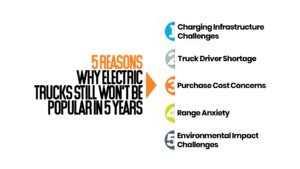Electric Truck Problems in USA

1. Infrastructure Challenges
One of the biggest roadblocks for electric trucks is the lack of robust charging infrastructure. Picture this: you’re on a long haul, and you suddenly realize there’s no charging station in sight. Yikes!
- Insufficient Charging Stations: Currently, the U.S. has a limited number of charging stations specifically designed for heavy-duty trucks. While efforts are underway to expand the network, it’s still far from comprehensive. Fleets need assurance that they can charge their vehicles quickly and conveniently, especially on long routes.
- Charging Time: Even with fast chargers, the refueling process for electric trucks takes significantly longer than a quick diesel fill-up. This could mean increased downtime for drivers, impacting overall efficiency.
2. Driver Shortage Woes
Let’s face it—our industry is grappling with a severe shortage of truck drivers. According to the American Trucking Associations, the U.S. could face a shortage of over 160,000 drivers by 2030.
- Training and Transition: Electric trucks come with new technology that requires specialized training. With an already tight labor market, finding drivers who are trained and willing to operate electric trucks will be a tough sell.
- Workforce Adaptation: Not only do we need more drivers, but the current workforce might not be ready to transition to electric vehicles. This could slow down adoption as companies hesitate to invest in electric trucks without enough qualified personnel.
3. Cost Concerns
While electric trucks offer long-term savings, the initial investment can be a major deterrent for many companies.
- High Upfront Costs: Electric trucks typically cost more upfront than their diesel counterparts. For smaller companies or those operating on thin margins, this can be a significant barrier. Even with incentives, the financial commitment may feel risky.
- Battery Replacement Costs: The lifespan of electric truck batteries is a concern. While technology is improving, replacing these batteries can be costly, and companies need to factor this into their overall budget.
4. Range Anxiety
Range anxiety is a real issue that can’t be ignored.
- Limited Range: Most electric trucks currently offer a range of about 300 miles on a full charge. For long-haul trucking, this can be limiting. Drivers are accustomed to the flexibility of diesel, and switching to electric may feel like a step backward.
- Routes and Planning: Trucking companies would need to carefully plan routes to ensure there are charging stations available, complicating logistics and potentially affecting delivery times.
5. Environmental Impact Concerns
While electric trucks are marketed as the green solution, there are underlying environmental issues.
- Battery Production and Disposal: The production of electric vehicle batteries can be resource-intensive and environmentally damaging. Moreover, the disposal of old batteries raises concerns about pollution and sustainability.
- Energy Sources: The overall environmental benefits depend on how the electricity powering these trucks is generated. If it comes from fossil fuels, the green advantage diminishes significantly.
Conclusion: A Bumpy Road Ahead
While electric trucks have the potential to transform the industry, there are significant challenges that could prevent them from becoming mainstream in the next five years. From infrastructure issues to the ongoing driver shortage, we have a long way to go before we see widespread adoption.
As we navigate these hurdles, it’s crucial for trucking companies to stay informed and prepared for what lies ahead. While the dream of a fully electric fleet is enticing, it’s important to keep our feet on the ground and recognize the realities we face.
If you want to dive deeper into this topic, feel free to share your thoughts or questions in the comments below!
